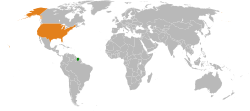
The economy of Angola remains heavily influenced by the effects of four decades of conflict in the last part of the 20th century, the war for independence from Portugal (1961–75) and the subsequent civil war (1975–2002). Despite extensive oil and gas resources, diamonds, hydroelectric potential, and rich agricultural land, Angola remains poor, and a third of the population relies on subsistence agriculture. Since 2002, when the 27-year civil war ended, government policy prioritized the repair and improvement of infrastructure and strengthening of political and social institutions. During the first decade of the 21st century, Angola's economy was one of the fastest-growing in the world, with reported annual average GDP growth of 11.1 percent from 2001 to 2010. High international oil prices and rising oil production contributed to strong economic growth, although with high inequality, at that time.
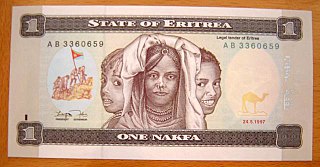
The economy of Eritrea has experienced considerable growth in recent years, indicated by an improvement in gross domestic product (GDP) in October 2012 of 7.5 percent over 2011. However, worker remittances from abroad are estimated to account for 32 percent of gross domestic product. Eritrea has an extensive amount of resources such as copper, gold, granite, marble, and potash. The Eritrean economy has undergone extreme changes due to the War of Independence.
Morocco is a member of the United Nations and belongs to the African Union, Arab League, Arab Maghreb Union (UMA), Organisation of Islamic Cooperation (OIC), the Non-Aligned Movement and the Community of Sahel-Saharan States (CEN_SAD). Morocco's relationships vary greatly between African, Arab, and Western states. Morocco has had strong ties with the West in order to gain economic and political benefits. France and Spain remain the primary trade partners, as well as the primary creditors and foreign investors in Morocco. From the total foreign investments in Morocco, the European Union invests approximately 73.5%, whereas, the Arab world invests only 19.3%. Many countries from the Persian Gulf and Maghreb regions are also getting more involved in large-scale development projects in Morocco.

Suriname or Surinam, officially known as the Republic of Suriname, is a country on the northeastern Atlantic coast of South America. It is bordered by the Atlantic Ocean to the north, French Guiana to the east, Guyana to the west, and Brazil to the south. At just under 165,000 square kilometers, it is the smallest sovereign state in South America. Suriname has a population of approximately 575,990, most of whom live on the country's north coast, in and around the capital and largest city, Paramaribo.

The economy of Suriname was largely dependent upon the exports of aluminium oxide and small amounts of aluminium produced from bauxite mined in the country. However, after the departure of Alcoa, the economy depended on the exports of crude oil and gold. Suriname was ranked the 124th safest investment destination in the world in the March 2011 Euromoney Country Risk rankings.
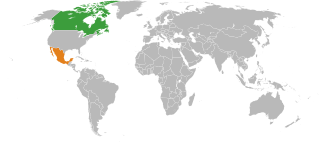
Canada–Mexico relations are relations between Canada and the United Mexican States. Although historic ties between the two nations have been dormant, relations between Canada and Mexico have positively changed in recent years, seeing as both countries brokered the NAFTA. They were on different sides of the Cold War Spectrum.

Ghana–United States relations refers to the diplomatic relations between Ghana and United States.
Prostitution in Suriname is illegal but widespread and the laws are rarely enforced. Human trafficking and Child prostitution are problems in the country. Prostitutes are known locally as "motyo". UNAIDS estimate there to be 2,228 prostitutes in the country.

Greece–Norway relations are foreign relations between Greece and Norway. The Greek Embassy in Oslo opened in 1980 and the Norwegian Embassy in Athens opened in 1974.

This article deals with the diplomatic affairs, foreign policy and international relations of Barbados.

Chile–Pakistan relations refers to the bilateral, diplomatic, commercial, economic and people-to-people linkages between Pakistan and Chile. The Embassy of Pakistan in Argentina is concurrent to Chile, likewise, the Embassy of Chile in the United Arab Emirates deals with matters pertaining to Pakistan.

Netherlands–Suriname relations refers to the current and historical relations between the Netherlands and Suriname. Both nations share historic ties and a common language (Dutch) and are members of the Dutch Language Union.
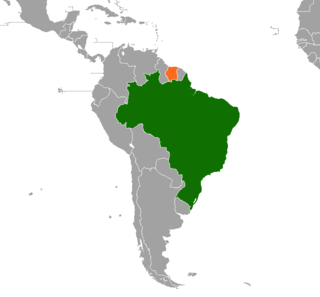
Brazil – Suriname relations refer to the bilateral relations between the Federative Republic of Brazil and the Republic of Suriname. Diplomatic relations were established on 3 March 1976. Brazil has an embassy in Paramaribo since the independence of Suriname on 25 November 1975. Suriname has an embassy in Brasília since 1976, and a consulate in Belém since 2012.
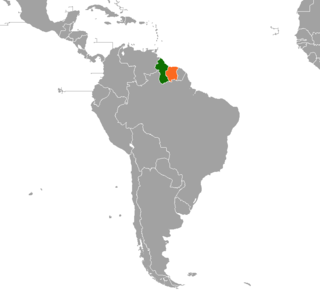
Guyana – Suriname relations refer to the bilateral relations between Guyana and Suriname. Suriname has an embassy in Georgetown. Guyana has an embassy in Paramaribo. The Courantyne River makes up most of the border between the two countries.

Mexico–Suriname relations refers to the diplomatic relations between Mexico and Suriname. Both nations are members of the Association of Caribbean States, Community of Latin American and Caribbean States, Organization of American States and the United Nations.

Nigeria–Spain relations are the bilateral and diplomatic relations between these two countries. Nigeria has an embassy in Madrid. Spain has an embassy in Abuja and a consulate-general in Lagos.

Suriname–Trinidad and Tobago relations refers to the bilateral relations between Suriname and Trinidad and Tobago. Both countries have some of the highest percentages of citizens adhering to Hinduism and Islam in The Americas. Both nations are a part of CARICOM and the OAS. Trinidad and Tobago has a Consulate in Paramaribo.
Diplomatic relations between Suriname and Venezuela were established in November 1975, shortly after the independence of Suriname. Suriname has an embassy in Caracas since 1976. Venezuela has an embassy in Paramaribo. As of 30 June 1978, there is no travel visa requirement between the two countries.

Diplomatic relations between France and Suriname were established on 25 August 1976. Suriname and the French overseas department of French Guiana share a common border of 520 kilometres (320 mi). Suriname operates an embassy in Paris, a consulate in Cayenne, and an honorary consulate in Saint-Laurent-du-Maroni. France operates an embassy in Paramaribo, a consulate in Georgetown, Guyana, and an honorary consulate in Albina.

Diplomatic relations between Cuba and Suriname were established on 23 March 1979. Suriname has an embassy in Havana since 2003. Cuba has an embassy in Paramaribo since 1981.
